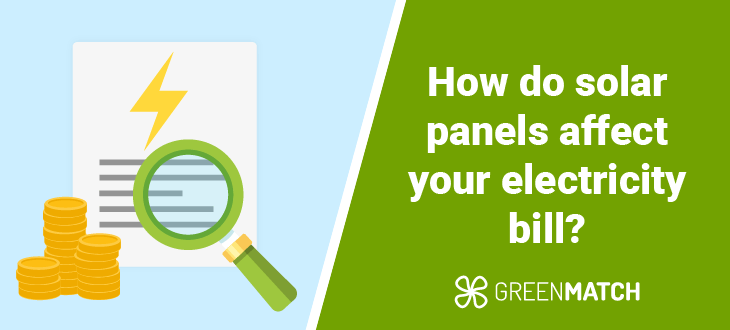Answer these simple questions and we will find you the BEST prices
Which type of solar quotes do you need?
It only takes 30 seconds
100% free with no obligation

Get up to 4 quotes by filling in only 1 quick form

Slash your energy bills by installing solar panels

For the average 2-3 bedroom house
- GreenMatch
- Solar Energy
- Solar Panels
- Electricity Bill With Solar Panels
Average Monthly Electricity Bill With Solar Panels UK (Guide 2025)


- The average home can save up to £330, saving up to 50% on their electricity bills compared to non-solar households.
- Solar panels reduce your electricity bills by reducing reliance on national grid power.
- The average annual electricity bill for a typical 2-3 bedroom house with a 4kW solar system is £330.
Solar panels bring a wealth of benefits to your home and way of life. Beyond environmental reasons, installing solar panels can significantly reduce your electricity bills by providing clean, renewable energy generated at home, reducing your home's reliance on grid power.
In this article, we'll take a closer look at the potential savings you could earn, factors that influence your solar panels’ output, and ways you can maximise these savings.
Ready to reap the rewards of solar energy? Simply share a few details, and our expert installers will provide you with up to 4 free quotes to compare, saving you the hassle of obtaining quotes yourself.
Click the button below to get started.
- Quotes from local engineers
- Payment by finance available
- Save up to £1,110 per year
It only takes 30 seconds



How do solar panels affect your electricity bill?
Solar panels reduce the amount of grid electricity your household consumes, thus bringing down your electricity bills. Solar panels do this by generating renewable energy that you can consume first, lowering the amount you need from your supplier.
A typical 2-3 bedroom household in the UK with a 4kW solar panel system can save up to £330, according to current electricity prices (Ofgem). In the following section, we'll dissect how these savings are made up and factors that can affect the level of savings you could potentially make.
An additional way to save on your electricity bill with solar panels is through a 'net metering' system. These systems let solar panel owners earn a rate per unit of solar energy they send to the grid.
Therefore, you can make some additional savings from any excess solar energy your system produces that you don't use. Through the Smart Export Guarantee, energy suppliers with over 150,000 customers are required to offer tariffs to solar panel owners in England, Scotland, and Wales.
SEG rates vary between suppliers, typically ranging from 1p to 30p per kilowatt-hour (kWh) exported. Some suppliers even offer dynamic tariffs that change every 30 minutes based on wholesale electricity prices.
What is the average monthly electricity bill with solar panels in the UK?
For a typical 2-3 bedroom house with a 4kW solar system, the average annual electricity bill savings is £330, which represents a 50% saving compared to non-solar households.
| Average monthly electricity bill with solar panels in the UK | ||||
|---|---|---|---|---|
| Household size | Annual electricity usage | Average electricity bill | Average electricity bill with solar panels | Savings after 25 years |
| Small; 1-2 bedrooms | 1,800 | £485 | £220 | £5,500 |
| Medium; 2-3 bedrooms | 2,700 | £730 | £330 | £8,250 |
| Large; 4-5 bedrooms | 4,100 | £1,110 | £502 | £12,550 |
When combining direct savings from reduced grid electricity usage with SEG payments, the best solar panels can make a significant impact on your electricity bills.
Solar panels don’t eliminate bills entirely. They generate no electricity overnight, meaning you will need to use grid power during this time. Additionally, winter months see reduced solar generation and higher demand, which also increases grid reliance.
The timing of energy use also impacts savings. If the home is empty during peak solar hours (10 am - 4 pm), excess energy is exported to the grid instead of being used on-site. Installing a solar battery can help store this energy for later use, helping to increase solar consumption closer to about 80%.
The Smart Export Guarantee (SEG) allows homeowners to earn £80 - £170 annually, based on the average tariff rate of 10.8p/kWh, by selling surplus energy back to the grid.
While solar panels won’t cover all electricity costs, they significantly reduce bills and typically pay for themselves within half their lifespan. Adding batteries can further enhance savings, but will extend the payback period because of the additional solar battery prices.
Factors that influence how much you save on electricity
Below we've listed some of the most important factors that will influence the amount of savings you can expect to make from installing solar panels:
Seasonal variations
Solar energy production fluctuates throughout the year. In summer (June - August), longer daylight hours and higher sun angles boost solar panel efficiency and output. On the other side, winter (December - February) sees shorter days and lower sun angles, reducing energy generation. This seasonal disparity impacts the amount of electricity you can generate and export annually.
System size and efficiency
The size and efficiency of your solar panel system determine how much electricity you produce. Larger, high-efficiency systems generate more energy, increasing both savings and export potential.
| Solar panel cost per system size | |||||
|---|---|---|---|---|---|
| Household size | System size | System cost | Electricity generated per year | Annual household electricity consumption | Average annual electricity bill |
| Small; 1-2 bedrooms | 3kW | £4,500 - £5,500 | 2,550kWh | 1,800 | £440 |
| Medium; 2-3 bedrooms | 4kW | £5,000 - £6,000 | 3,400kW | 2,700 | £660 |
| Large; 4-5 bedrooms | 6kW | £9,500 - £10,500 | 5,100kW | 4,100 | £1,005 |
Solar panel cost estimates are provided by the UK government. Average annual electricity bills do not include standing charges.
Local climate and weather
Regional differences in the UK’s climate affect solar panel performance. Areas with more sunny days experience greater energy production and higher savings compared to regions with frequent cloud cover.
Electricity prices
The average cost of electricity plays a key role in savings. Higher electricity prices mean greater savings for every unit of solar energy you generate and use. As of April 2025, the current rate of electricity is 27p/kWh.
How to maximise solar panel savings
There are some key ways you can maximise the savings you make after installing solar panels, as we've listed below:
Dynamic time-of-use tariffs
Some suppliers offer dynamic tariffs where electricity prices can change daily or even hourly based on wholesale electricity prices. These tariffs can bring you additional savings if you align your energy use (or battery charging) with periods of lower prices.
Smart Export Guarantee (SEG) tariffs
The SEG scheme allows you to earn money by exporting excess electricity generated by solar panels back to the grid. Different energy suppliers offer varying SEG rates, which can significantly impact your savings. For example, Octopus Energy offers 30p per kWh exported during peak hours (4 - 7 pm) for customers with solar panels and an eligible battery.
Top tip: Many energy providers offer better SEG rates to their own customers. Switching your energy supplier to access higher export rates could significantly increase your earnings.
Time-of-use tariffs
Some energy providers offer time-of-use tariffs, which charge different rates for electricity depending on the time of day. These tariffs typically have lower rates during off-peak hours (usually at night) and higher rates during peak hours.
For solar panel owners, this can impact savings in two ways:
- You can use more grid electricity during cheaper off-peak hours.
- If you have a battery storage system, you can store excess solar energy during the day and use it during peak hours when grid electricity is more expensive.
Battery storage
Installing a battery storage system can increase your self-consumption rate by allowing you to store excess solar energy for use during non-generating hours. This can lead to greater savings, especially if combined with a time-of-use tariff.
Self-consumption rates
The percentage of solar-generated electricity you use directly (self-consumption) significantly affects your savings. The more solar energy you use yourself, the less you need to buy from the grid. For example, if you're home during the day and can run appliances when your solar panels are generating electricity, you'll save more than if you're typically away during peak generation hours.
Roof orientation and shading
Proper roof orientation and minimising shading are crucial for maximising solar panel efficiency:
- Orientation: In the UK, south-facing roofs are ideal for solar panels. However, panels can face up to 45 degrees east or west of due south without a significant drop in energy production.
- Tilt angle: The optimal tilt angle for solar panels is generally equal to your latitude. For example, in the UK (around 51-55 degrees latitude), a tilt angle of 30-40 degrees is typically recommended.
- Minimise shading: Even partial shading can significantly reduce solar panel efficiency. Conduct a thorough site assessment to identify and address potential shading sources. Micro-inverters or power optimisers can help minimise the impact of partial shading on overall system performance.
Are solar panels the right choice for you?
Incorporating solar panels into your home is a smart way to lower electricity bills and even earn extra income through schemes like the SEG, which pays for surplus energy sent to the grid.
Solar panels lower your electricity bills by reducing reliance on grid power. A typical 2 - 3 bedroom UK household with a 4kW system can save up to £330 annually by using solar energy instead of grid electricity.
With the right setup and usage habits, solar energy can be a cost-effective and sustainable choice that upgrades your home for years to come.
Now that you're clued up on the potential savings that come with installing solar panels, the next step is to compare quotes from reputable installers. It's the most effective way of landing a good deal.
However, who has time for hours of scouring the sea of options out there? Instead, let us connect you with the best installers in our network through our 30-second form. Their quotes are free, tailored, and come with no obligations.
Get started by clicking the button below.
- Quotes from local engineers
- Payment by finance available
- Save up to £1,110 per year
It only takes 30 seconds



FAQ
After installing solar panels, a typical 2-3 bedroom home in the UK can expect to pay at least £330 per year on its electricity bills.
A typical 2-3 bedroom household can save up to £330 per year on its electricity bills. This represents a 50% reduction compared to non-solar households.
Before installing solar panels, the average 2-3 bedroom home can expect to pay £660 annually on their electricity bills. This is based on the current electricity price cap per unit of energy and typical household consumption values offered by Ofgem.

Ciaran is a content writer at GreenMatch. Whether writing about sustainable aviation fuel or heat pumps, Ciaran has passion for informing readers about pivotal technologies that are reshaping our world.
We strive to connect our customers with the right product and supplier. Would you like to be part of GreenMatch?

- Average Monthly Electricity Bill With Solar Panels UK (Guide 2025)
- How do solar panels affect your electricity bill?
- What is the average monthly electricity bill with solar panels in the UK?
- Factors that influence how much you save on electricity
- How to maximise solar panel savings
- Are solar panels the right choice for you?
- FAQ
